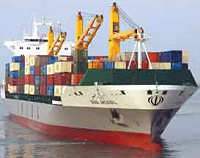 The Islamic Republic of Iran Shipping Lines (IRISL) is running out of countries to flag its ships in its increasingly futile efforts to avoid U.S. sanctions on the company. Even Tuvalu, the fourth smallest country in the world, deregistered 44 IRISL oil tankers recently. (That’s rather like being ejected from an Olive Garden restaurant in Dothan, Alabama.)
The Islamic Republic of Iran Shipping Lines (IRISL) is running out of countries to flag its ships in its increasingly futile efforts to avoid U.S. sanctions on the company. Even Tuvalu, the fourth smallest country in the world, deregistered 44 IRISL oil tankers recently. (That’s rather like being ejected from an Olive Garden restaurant in Dothan, Alabama.)
A Wall Street Journal article (subscription required) that appeared on September 28 details IRISL’s current woes in using the flags of convenience of two land-locked countries, Mongolia and Moldova, the latter a country most-renowned for its frequent utility as an obscure crossword puzzle entry. Moldova had begun to cancel IRISL registrations but those ships quickly obtained registrations from Mongolia. Now Mongolia is announcing that it will deregister the ships.
Of course, an IRISL vessel is subject to sanctions no matter what flag it is flying, but IRISL is hoping to confuse people by using flags of convenience rather than an Iranian flag for the ships. An IRISL spokesman is quoted by the Journal on the company’s rather quaint theory of reflagging its ships:
“When you push someone from a room, he should find a door,” said Ali Ezzati, Irisl’s manager for strategic planning and international affairs, on the sidelines of a shipping conference in Xiamen, China. “If he can’t find a door then he should try to find a small hole.”
I suppose that his choice of metaphors here was uninformed by the fact that small holes are the way that rats and cockroaches get into a room. I think I would have gone for window.
And, as is often the case when journalists not normally on the sanctions beat try to tackle sanctions issues, the Journal story has an amusing whopper about the Iran sanctions. The article explained that the Iran sanctions “are tied to money transactions with bank and trade services.” Er, no. All transactions with Iran are prohibited (with the exception of certain otherwise authorized transactions such as those involving food, medicine and informational materials) whether or not any money is paid and whether or not they involve “bank or trade services.” I wonder how many people will read the article and figure that the regulations don’t prohibit dealings with Iran if no payments are made. Sigh.

 Posted by
Posted by  Category:
Category: 

 United Against Nuclear Iran (“UANI”) is at it again, and the latest windmill in its quixotic quest at ending all international commerce with Iran is the Internet Corporation for Assigned Names and Numbers (“ICANN”) because, apparently, Iran is still connected to the Internet and it is, apparently, somehow ICANN’s fault. In a ridiculousÂ
United Against Nuclear Iran (“UANI”) is at it again, and the latest windmill in its quixotic quest at ending all international commerce with Iran is the Internet Corporation for Assigned Names and Numbers (“ICANN”) because, apparently, Iran is still connected to the Internet and it is, apparently, somehow ICANN’s fault. In a ridiculous  Last Thursday the House Intelligence Committee
Last Thursday the House Intelligence Committee 
 The way that U.S. sanctions protect us from Iranian nuclear weapons are indeed wondrous and diverse, as Iranians themselves recently learned when they sat down recently at their computers to don the virtual identity of sword-wielding warriors wandering through imaginary realms to defeat trolls, elves, ogres and other malevolent creatures.
The way that U.S. sanctions protect us from Iranian nuclear weapons are indeed wondrous and diverse, as Iranians themselves recently learned when they sat down recently at their computers to don the virtual identity of sword-wielding warriors wandering through imaginary realms to defeat trolls, elves, ogres and other malevolent creatures. 

